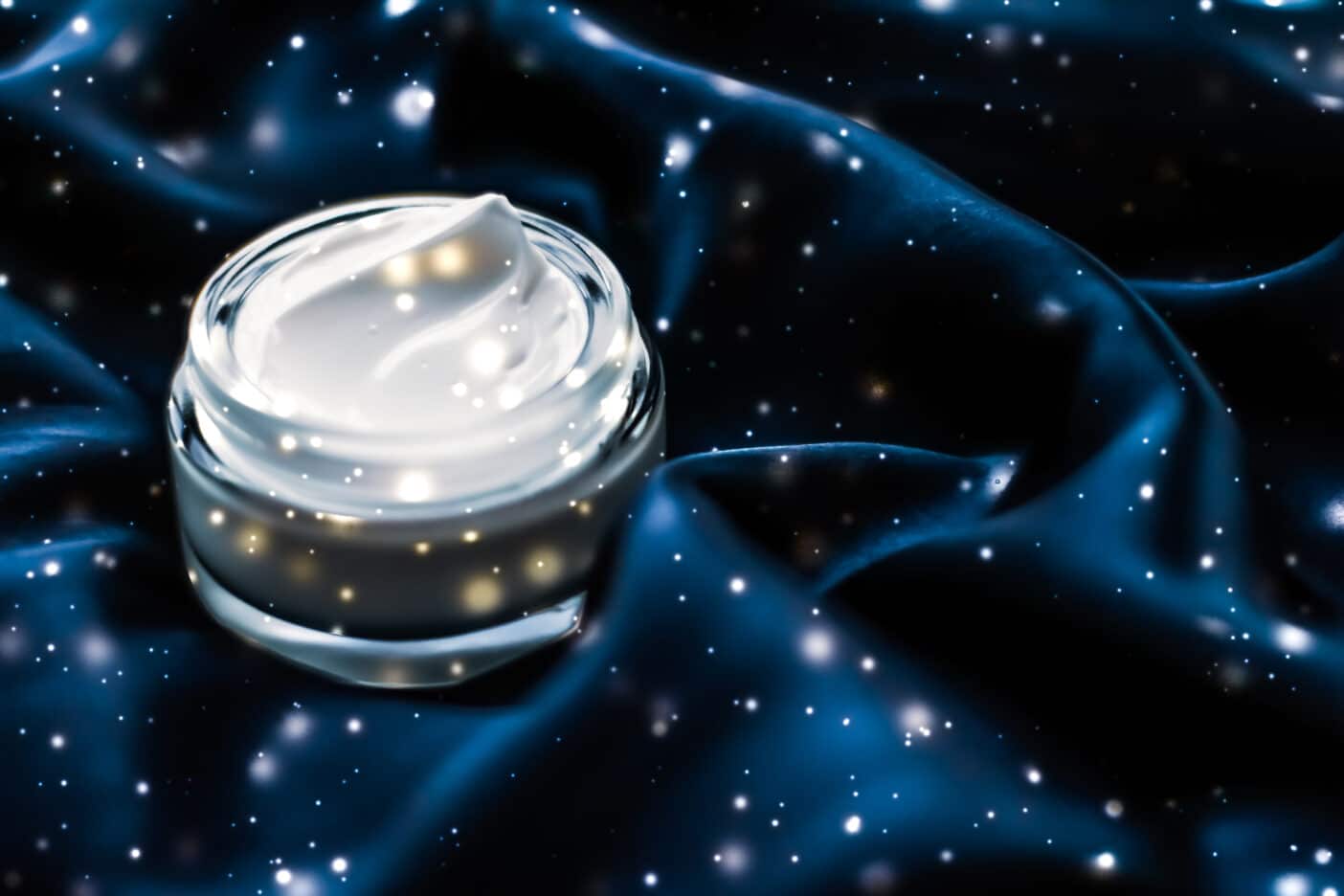Night cream

While we sleep, our organism does not remain inactive. In order for our skin to regenerate and new skin cells to be formed, it produces the growth hormone somatropin during the night and ramps up protective and repair programmes. A high-quality night cream gently supports these mechanisms. Since the pores widen when we sleep, the skin can absorb the active ingredients particularly well. While we sleep, it has enough time to recover and regenerate. But that doesn’t work if we toss and turn sleeplessly in bed. That’s why night cream is useful and important, but it can only work if we get enough sleep.
What is a good night cream made of?
Three basic aspects form the foundation of a good night cream: on the one hand, there are moisturisers and lipids, and on the other, vitamins and antioxidants that fight free radicals. The third pillar consists of the basic building blocks of our skin, which are usually ceramides.
Let’s start with the moisturisers. Our skin also needs to be optimally moisturised at night. Hyaluronic acid provides a lot of moisture, works against wrinkles and maintains the skin’s elasticity. High-quality lipids and plant oils can be used as supplements to help the skin retain moisture. Squalane is recommended for a particularly rich night cream. It nourishes the skin, combats wrinkles caused by dryness and ensures that the complexion is radiant again during the day.
At least as important for a good night cream are vitamins and antioxidants. Vitamins A, C and E are strong radical scavengers, boost the formation of collagen and reduce the appearance of wrinkles.
The last pillar is the basic building blocks of our skin, i.e. ceramides, but also phosphatidylcholines and sphingosines. Ceramides in night creams provide valuable support in building up the skin barrier. Phosphatidylcholines, on the other hand, are primarily responsible for skin renewal. Depending on the skin type, a night cream can also be enriched with Q10, minerals, fruit acids, retinoids and coenzymes.
How does night cream differ from day cream?
First of all, there is no UV filter in night cream, as this is naturally superfluous in the dark. It is usually richer than day creams, which means it provides more moisture. During the day, on the other hand, we mainly want a light cream that is quickly absorbed and does not leave a shiny film. However, the night cream does not necessarily have to be particularly rich. For oily skin that is prone to pimples and impurities, it is even counterproductive, as it could further worsen the skin’s appearance. Rather dry skin, however, benefits – especially in winter – from a rich night cream.
Which night cream is really good?
If you want to buy a high-quality face cream for the night, you should make sure that it does not contain any fragrances. These could cause impurities and irritate the skin. Alcohol also has no place in the cream. If you want to be on the safe side, opt for natural cosmetics without fragrances, alcohol, mineral oil and silicones.
Fact sheets of the most important ingredients for night creams
Phyto Squalane
INCI: Squalane
CAS number: 111-01-3
Description: a colourless, oily liquid
Extraction: mainly from olive oil
Effect: protects the skin from moisture loss, makes it supple and smooth, can positively influence the absorption of night creams
Special features: very mild
Ceramide
INCI: ceramides NP (ceramide 3)
CAS number: 72968-43-5
Chemical name: N-Oleoyl-phytoshingosine
Description: Basic building block of our skin
Effect: improves the skin’s own barrier function, reduces transepidermal water loss, anti-ageing active substance
Vitamin C derivatives
SAP
INCI: Sodium Ascorbyl Phosphate
CAS number: 66170-10-3
Description: a water-soluble derivative of vitamin C, particularly stable
Effect: reduces oxidative stress, thus slows down the ageing process, has slightly skin-lightening properties
Ethyl Ascorbic Acid
INCI: 3-O-Ethyl Ascorbic Acid
CAS number: 86404-04-8
Description: a water-soluble and very stable vitamin C derivative
Effect: improves collagen synthesis, reduces wrinkles, repairs and protects the skin in case of sun damage, slightly brightening
Glyceryl Ascorbate
INCI: Glyceryl Ascorbate
CAS number: 1120360-13-5
Description: a novel and very stable vitamin C derivative, is produced by binding vitamin C (ascorbic acid) to glycerol.
Effect: has very good antioxidant and moisturising properties.
Essential natural oils
Olive oil
INCI: Olea Europaea (Olive) Fruit Oil
CAS number: 8001-25-0
Extraction: by cold pressing from olive pulp
Effect: Stimulates cell renewal, moisturises the skin, combats wrinkles
Almond oil
INCI: Prunus amygdalus dulcis (Sweet Almond) Oil)
CAS number: 8007-69-0
Extraction: by cold pressing from ripe almonds
Effect: Soothes irritations, makes the skin feel soft and smooth
Kahai oil / Cacay oil
INCI: Caryodendron Orinocense Seed Oil
CAS number: 1453469-52-7
Extraction: from the nuts of the Cacay tree (Caryodendron Orinocense)
Effect: protects against free radicals, improves firmness and elasticity of the skin, moisturising
Vitamin F
Description: not a vitamin in the classical sense, but the old name for the essential fatty acids alpha-linolenic acid and linoleic acid.
INCI: Linolenic acid (CAS number: 463-40-1) and linoleic acid (CAS number: 60-33-3)
Effect: strengthens the natural skin protection layer, prevents moisture loss, mild anti-inflammatory properties
A high-quality night cream to complement your product line
Most users combine their day care with a sophisticated night cream so that the skin can virtually recover while they sleep. Thanks to innovative active ingredients, a good night cream ensures that the skin is optimally supplied with nutrients and cared for. Let us advise you if you would like to add a night cream to your product range.
Literature:
Comparison of topical antiaging creams in the management of lateral canthal lines.
Carroll JM, Hanna S, Guenther LC, Boucher N.J Cosmet Dermatol. 2020 Mar;19(3):694-704
Alvares BA, Miola AC, Schimitt JV, Miot HA, Abbade LPF.An Bras Dermatol. 2022 Mar-Apr;97(2):157-165
